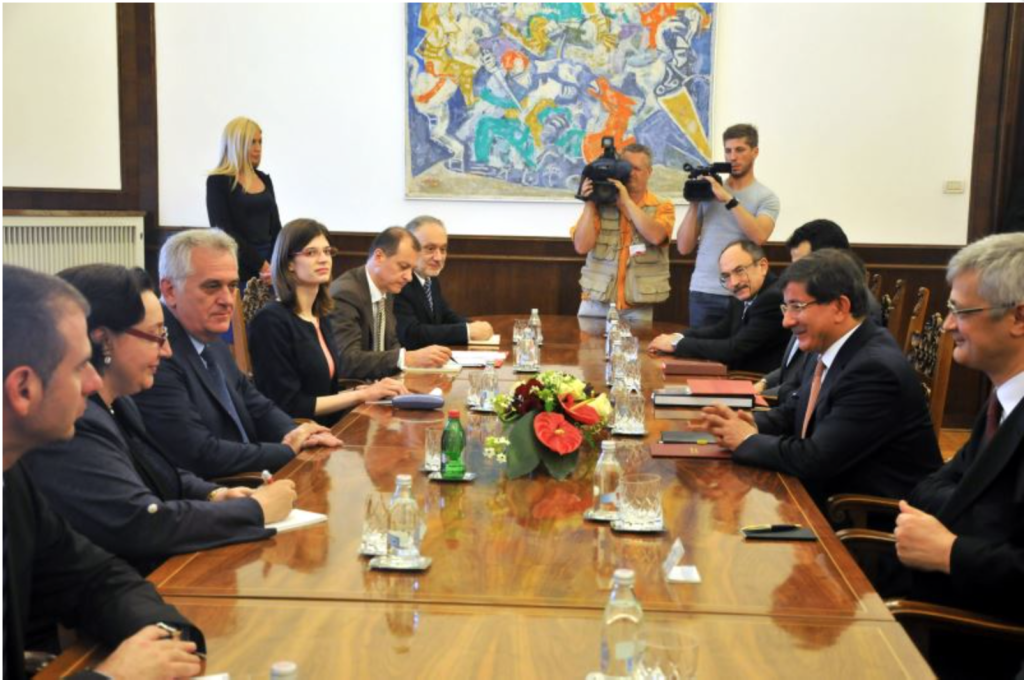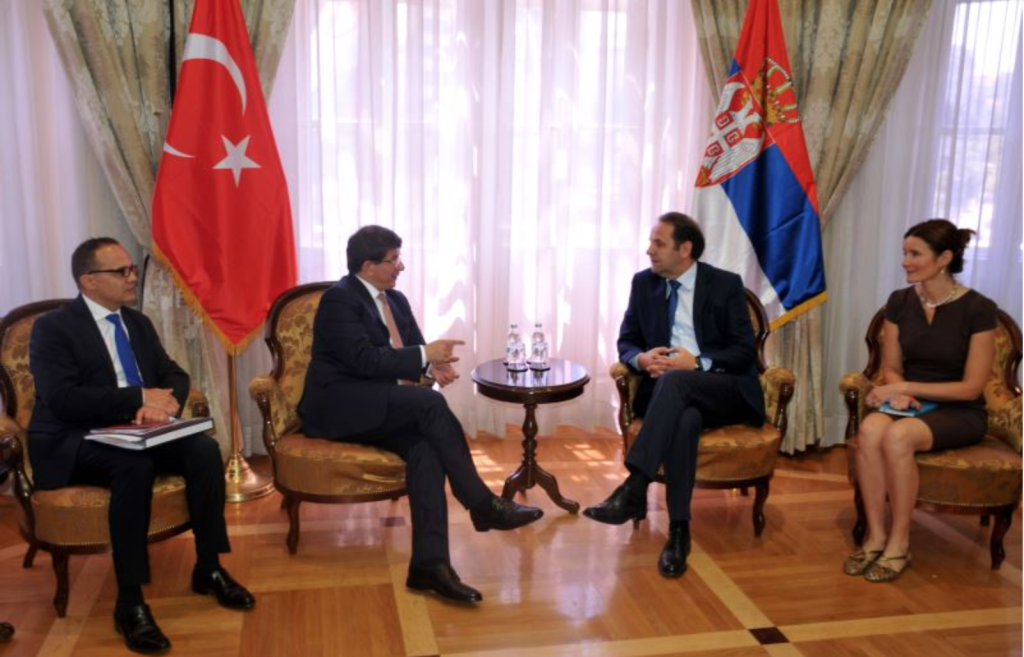Welcome to the “golden age” of Serbia – Turkey relations.
The Turkish Foreign Ministry’s website has published a statement claiming that Turkey’s relations with Serbia are currently at their “highest level” in history.
“This is the golden era in the economic relations between Serbia and Turkey,” Rasim Ljajić, Serbia’s Minister of Trade, Tourism and Telecommunications recently said of the two longtime, bitter adversaries.
It’s a situation unimaginable just a few years ago, and still probably unbelievable to those who can remember back as far as 2013, when then-Prime Minister of Turkey Recep Tayyip Erdoğan held a rally in Prizren and told the crowd “Kosovo is Turkey, Turkey is Kosovo”, stirring up neo-Ottoman fears and fantasies, along with a whole cauldron of “Balkan passions”.
But apparently it’s true. Travel between Serbia and Turkey is said to be booming like never before: There were 20,000 passengers on flights between Belgrade and Istanbul in January of this year, which Ljajic says is nearly twice the number of passengers that flew the same route over the same period last year. Turkey is now the second most popular foreign vacation destination for people from Serbia, right behind Greece. “Telenovelas and Serbian tourists have contributed to improving our mutual relations and the elimination of stereotypes,” Ljajić explained. So has money, apparently.
In October, Halkbank, one of two major state-owned Turkish lenders, opened its first branch in Serbia. The government-controlled bank is one of the biggest and most visible in Turkey, and in 2014 had assets valued at more than $60 billion. Turkish Economy Minister Nihat Zeybekçi flew to Belgrade for the branch’s opening ceremony. “We as Turkey support Turkish companies to invest in Serbia,” he told the crowd of foreign dignitaries and Serbian ministers, including Ljajic.
An announcement about the opening ceremony for the Halkbank branch in Belgrade was posted on the ruling AK Party’s website. President Recep Tayyip Erdoğan is believed to have close ties to the state-controlled Halkbank. When the Turkish corruption scandal broke in 2013, ensnaring many members of his inner circle, Halkbank’s former general manager Süleyman Aslan was among them. Police discovered shoe boxes full of cash worth a total of $4.5 million in his home closet.

Halkbank also purchased a 76.76 percent stake in Serbia’s Cacanska Banka for $10.73 million back in March. At the time of purchase, Cacanska Banka had 390 employees working in 23 branches in 11 cities across Serbia. An announcement about the acquisition from Halkbank stated that it was “among Halkbank’s goals for the bank to expand its branch network in the country.”
The announcement also said that Halkbank aimed to “serve as a bridge between Turkey and Serbia.”
Interestingly, Halkbank opened its 33rd branch in neighboring Macedonia in June. The new location is in the capital of Skopje’s Cair Municipality, in the Ottoman-style Old Town. Speaking at the opening ceremony in Skopje, the general director of Halkbank Macedonia, Necdet Palakçı, said Halkbank “had already bought a majority stake in Serbia’s Cacanska bank” and that it aimed to be “the top bank in the entire region”.
But the Director General of Halbank, Mustafa Aydın, toned it down for the potentially more sensitive Serbian audience. “Halbank are not planning to be the biggest bank, but they are definitely planning to be among the most powerful banks in the region,” he said.
Halkbank has been accused of all kinds of malfeasance. Recently, a whistleblower reported that billions of dollars had been transferred to Erdogan’s closest associates, resulting in non-performing loans.
On February 25th, Belgrade’s Hotel Metropol hosted a conference called “Further Development of Economic Relations Between Turkey and Serbia” with the backing of Halkbank, among other sponsors. Ljajic said that Halkbank’s entry onto the Serbian market was “important for improving relations between the two countries.”
The website for Turkey’s foreign ministry says that Serbia’s Sandzak region “is viewed as a bridge of friendship between the two countries”. Sandzak is an ethnically diverse, Bosniak-majority region of Serbia, and most of its inhabitants identify as Muslim. Rasim Ljajić, Serbia’s Minister of Trade, Tourism and Telecommunications, is a Bosniak politician from Sandzak. The Turkish MFA’s website notes that “the region plays an important role in the context of bilateral relations.”
At an October 19th meeting in Belgrade, representatives of Turkey, Bosnia and Serbia signed a two-year action plan aimed at strengthening economic cooperation. Part of the deal includes the opening of a regional economy and trade office for Serbia and Bosnia-Herzegovina in Istanbul. “If Turkey, Serbia and Bosnia unite with a free trade agreement, it can become the most comprehensive and liberal agreement in the region,” said Zeybekci, Turkey’s Minister of the Economy.
The Turkish ambassador to Serbia, Mehmet Kemal Bozay, explained to Beta News that Turkey was especially interested in investing in southern Serbia. Turkish company Jeanci opened two new facilities for the production of denim in Serbia this year, one of which is in the southern city of Leskovac. Together with its Krupanj factory in the western part of the country, Jeanci now employs a total of 1,100 workers.

Bozay also suggested that Turkish companies might be interested in participating in the reconstruction of Constantine the Great airport in the southern city of Nis. Turkish firms have been in charge of the recent reconstruction of other airports in the region. Pristina airport was completed by Limak, while Skopje airport was reconstructed by TAV. Nis airport had been mostly empty for a few years, save for the odd charter flight that passed through. WizzAir changed that this summer when it began operating scheduled flights to and from Malmo and Basel. Pegasus Airlines, a low-cost Turkish carrier, hopes to follow and open a regular route between Nis and Istanbul. On October 7th, Prime Minister Aleksandar Vucic met with Ambassador Bozay, praised the growth of the tourism sector, and stressed that Turkish investors were welcome in Serbia.
For years, Serbia and Turkey have tended to view each other with mutual suspicion, even loathing. Ottoman history and Turkey’s support for Serbia’s opponents during the 1990s wars are two oft-cited explanations. Now Amassador Bozay says “growing political, economic and cultural cooperation between the two countries are at their highest level”.
Since the November 24th downing of a Russian bomber by Turkish fighter jets, relations between the Kremlin and Ankara have deteriorated beyond all recognition. Russia has imposed a series of sanctions on Turkey, including a ban on charter flights between the two countries and prohibitions on imports of Turkish fruits, poultry and salt. On December 16th, Russian media announced an expansion of the existing sanctions to include a new ban on joint projects in woodworking, pilot training and the hospitality industry.
Belgrade’s response to the downing of the Russian Sukhoi Su-24 has been fairly predictable. Grandfatherly Russophile President Tomislav Nikolic gave an exclusive interview to the Russian portal Sputnik, and his comments were characteristically caustic; he accused Turkey not only of supporting terrorism but of trying to stir up a violent conflagration between Russia and NATO. Top Serbian football club Red Star also announced that it may abandon plans to conduct its winter training in Turkey in a show of solidarity with Russia. Prime Minister Aleksandar Vucic, was comparatively inoffensive as usual, the reliable partner the west has come to count on.
Under significant pressure, Serbia has staunchly refused to join any western sanctions imposed on its longtime ally Russia for the war in Ukraine. But Serbia’s historic allegiance to the Orthodox Brotherhood in Russia has not made it to reconsider its evolving economic relationship with Turkey.
On December 7th, Prime Minister Aleksandar Vucic confirmed the importance of this “golden age” of relations when he spoke with Turkish Foreign Minister Mevlut Cavusoglu about Serbia and Turkey’s excellent partnership, deepening economic cooperation and the upcoming visit of Turkish Prime Minister Ahmet Davutoglu to Serbia.
Cover photo credit: MFA Turkey

